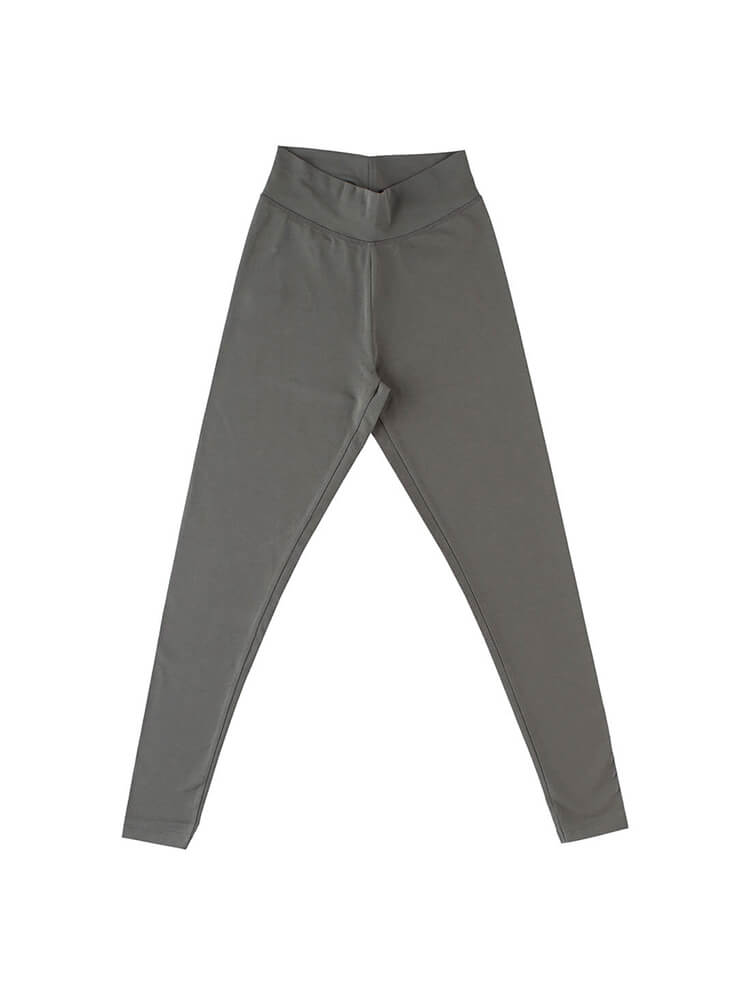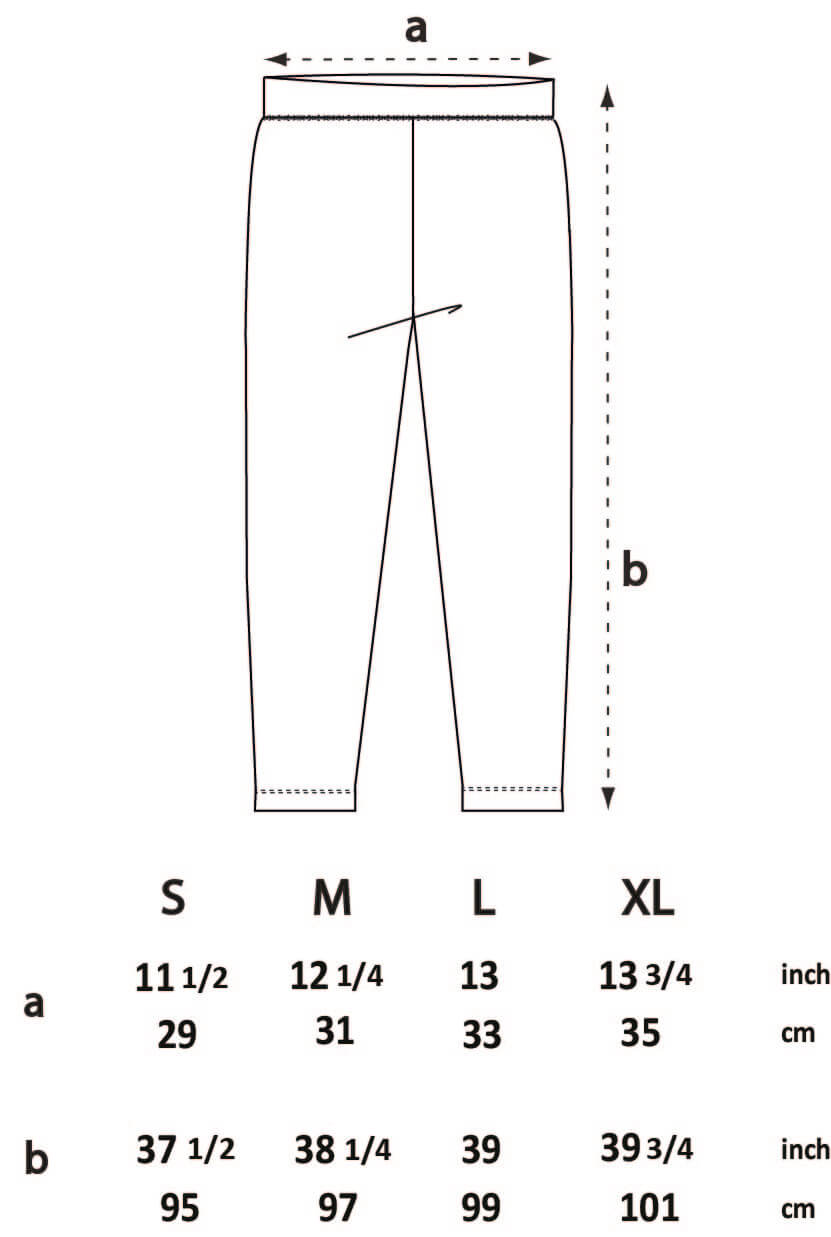-
Tipo
-
CategoriaColori
- View All Colours
Colori
-
Aiuto e supporto
- Domande Frequenti
- Produzione Su Misura
- Risorse
- Privacy
Aiuto e supporto -
La nostra Azienda
- Cosa facciamo
- Contatto
- Blog
La nostra Azienda -
Nostri Marchi

N86
leggings elasticizzati da donna
Bamboo 2025 Collection
- S
Jersey 5.9 oz / 200 g
-

DG - Dark Grey
95% Cotone pettinato biologico 5% Lycra élasthanne

Continental Clothing Co. is licensed by the Soil Association and the Control Union to supply fully certified organic products in accordance with the Global Organic Textile Standard. Licence number DK19090. The Company also holds a licence to use the Soil Association Organic Standard logo on products that meet the organic standard criteria.
All the certified products that are sold 'unprocessed', that is without printing or other chemical processing, can carry the logo. Garments that are printed by licensed printers according to the organic standard can also carry the organic standard logo at the point of sale.
The aim of the standard is to define world-wide recognised requirements that ensure organic status of textiles, from harvesting of the raw materials, through environmentally and socially responsible manufacturing up to labelling in order to provide a credible assurance to the end consumer.
Textile processors and manufacturers are enabled to export their organic fabrics and garments with one certification accepted in all major markets. Approved are natural fibres that are certified organic and fibres from conversion period certified according to recognised international or national standards and certified by any IFOAM accredited or internationally recognised (according to ISO 65) certifier.
Key criteria for processing and manufacturing include:
Environmental Criteria
- At all stages through the processing organic fibre products must be separated from conventional fibre products and must to be clearly identified
- All chemical inputs (e.g. dyes, auxiliaries and process chemicals) must be evaluated and meeting basic requirements on toxicity and biodegradability/eliminability
- Prohibition of critical inputs such as toxic heavy metals, formaldehyde, aromatic solvents, functional nano particles, genetically modified organisms (GMO) and their enzymes
- The use of synthetic sizing agents is restricted; knitting and weaving oils must not contain heavy metals
- Bleaches must be based on oxygen (no chlorine bleaching)
- Azo dyes that release carcinogenic amine compounds are prohibited
- Discharge printing methods using aromatic solvents and plastisol printing methods using phthalates and PVC are prohibited
- Restrictions for accessories (e.g. no PVC, nickel or chrome permitted)
- All operators must have an environmental policy including target goals and procedures to minimise waste and discharges
- Wet processing units must keep full records of the use of chemicals, energy, water consumption and waste water treatment, including the disposal of sludge. The waste water from all wet processing units must be treated in a functional waste water treatment plant.
- Packaging material must not contain PVC. Paper or cardboard used in packaging material, hang tags, swing tags etc. must be recycled or certified according to FSC or PEFC
Technical Quality and Human Toxicity Criteria
- Technical quality parameters must be met (s.a. rubbing, perspiration, light and washing fastness and shrinkage values)
- Raw materials, intermediates, final textile products as well as accessories must meet stringent limits regarding unwanted residues
Minimum Social Criteria
Minimum social criteria based on the key norms of the International Labour Organisation (ILO) must be met by all processors and manufacturers, including at farm level. They must have a social compliance management with defined elements in place to ensure that the social criteria can be met. For adequate implementation and assessment of the following social criteria topics the listed applicable key conventions of the International Labour Organization (ILO) have to be taken as the relevant basis for interpretation.
- Employment is freely chosen
- There is no forced or bonded labour
- Freedom of association and the right to collective bargaining are respected
- Working conditions are safe and hygienic
- Child labour must not be used
- Living wages
- Working hours are not excessive
- No discrimination is practised
- Regular employment is provided
- Harsh or inhumane treatment is prohibited
Quality Assurance System
Generally a company participating in the GOTS certification scheme must work in compliance with all criteria of the standard. GOTS relies on a dual system to check compliance with the relevant criteria consisting of on-site auditing and residue testing.
Read the full standard here


As more and more people vow never to clothe themselves in cruelty, retailers and designers are meeting the demand for animal-friendly clothes in style.
Although you can easily find fashionable animal-free products in many high-street stores, some companies go further, either by ensuring that everything they sell is 100 per cent vegan or by clearly sign-posting their vegan products. The “PETA-Approved Vegan” logo is a way of recognising these progressive compassionate businesses – and helping ethical consumers identify where to shop with confidence, safe in the knowledge that they’re not supporting the exploitation of animals.
Check the listing of brands HERE
About PETA
The People for the Ethical Treatment of Animals (PETA) Foundation is a UK-based charity dedicated to establishing and protecting the rights of all animals.
Like humans, animals are capable of suffering and have interests in leading their own lives; therefore, they are not ours to use – for experimentation, food, clothing, entertainment or any other reason. PETA and our affiliates around the world educate policymakers and the public about cruelty to animals and promote an understanding of the right of all animals to be treated with respect.
https://www.peta.org/about-peta/contact-peta/

Continental Clothing Co. products have been tested and certified under OEKO-TEX® Standard 100 Class I by Shirley Technologies in England since 2004.
The OEKO-TEX® Standard 100 is an independent testing and certification system for textile raw materials, intermediate and end products at all stages of production.
The testing for harmful substances always focuses on the actual use of the textile. The more intensive the skin contact of a product, the stricter the human ecological requirements to be met. The Continental Clothing certificate meets Class I criteria for textile items for babies and toddlers up to 3 years, the highest of the four classes of certification.
The requirement for certification of textile products according to OEKO-TEX® Standard 100 is that all components of an item have to comply with the required criteria without exception – that means in addition to the outer material also sewing threads, linings, prints etc. as well as non-textile accessories such as buttons, zip fasteners, rivets etc.
On the basis of its comprehensive and strict catalogue of measures, with several hundred regulated individual substances, the STANDARD 100 by OEKO-TEX® takes account of:
- Important legal regulations, such as banned Azo colourants, formaldehyde, pentachlorophenol, cadmium, nickel, etc.
-
Numerous harmful chemicals, even if they are not yet legally regulated.
-
Requirements of Annexes XVII and XIV of the European Chemicals Regulation REACh as well as of the ECHA SVHC Candidate List insofar as they are assessed by expert groups of the OEKO-TEX® Association to be relevant for fabrics, textiles, garments or accessories. Discussions and developments that are considered to be relevant are taken into account as quickly and effectively as possible through updates to the STANDARD 100 by OEKO-TEX® requirements.
-
Requirements from the US Consumer Product Safety Improvement Act (CPSIA) regarding lead.
-
Numerous also environmentally relevant substance classes
Confidence in Textiles – that has been the motto of the independent testing for harmful substances according to OEKO-TEX® Standard 100 for textile products of all types which pose no risk whatsoever to health since 1992.
The OEKO-TEX® label indicates the additional benefits of tested safety for skin-friendly clothing and other textiles to interested end users. The test label therefore provides an important decision-making tool for purchasing textiles.


Fair Wear Foundation is an independent, non-profit organization striving to improve working conditions in the textile industry. The foundation is an initiative by trade organizations in the textile sector, trade unions and NGO's.
Fair Wear Foundation verifies that member companies implement the Code of Labour Practice along their supply chain, and checks compliance by monitoring audits and remediation efforts. Annual reporting by member companies and by FWF itself promotes transparency at all levels.
The annual performance check reports are available on the Fair Wear Foundation page here.
Continental Clothing Co. has been a member since 2. October 2006.
Perché non vedo i prezzi?
Siamo un'azienda all'ingrosso e non vendiamo al pubblico.
A causa della natura degli acquisti all'ingrosso, quantità elevate influenzano il prezzo di ciascun articolo rche è disponibile ai nostri clienti.
Se hai una attività commerciale e vuoi acquistare da noi devi prima registrarti qui sotto
Commercia con noiConto
A proposito
Continental and EarthPositive are registered trademarks of Continental Clothing Company. All rights reserved. © 2025





